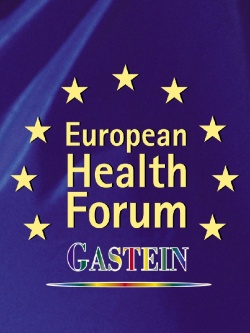The European Health Forum Gastein
Founded in 1998, the European Health Forum Gastein (5-8 October, Salzburg, Austria) is Europe’s leading health political conference, attracting 600 participants from around 60 countries. Beyond the EU, its leading role is underlined by the participation of active members from the GUS states, south-eastern European countries and Taiwan, Christian Pruszinsky reports.


The event has become an international meeting place for top-level healthcare politicians, managers and scientists from all over the world, EHFG president Professor Günther Leiner points out. ‘When it comes to health political discussion and the exchange of information on the highest level then the EHFG is probably unique in Europe.’ This year, in Salzburg, intensive dialogue between those in politics, administration, science and research, economics, civilians, with key players from the EU member countries as well as others in the WHO region Europe.
High-ranking speakers will include: John Dalli, EU Commissioner for Health and Consumer Policy, Máire Geoghegan- Quinn, EU Commissioner for Research, Innovation and Science, Ewa Kopacz, Minister of Health of the Republic of Poland (EU presidency country for the second half of 2011), Bertel Haarder, Minister of the Interior and Health, Denmark (EU presidency country for the first half of 2012), Taiwanese Health Minister Chiu, WHO Europe director Zsuzsanna Jakab and Austrian Health Minister and host of the event Alois Stöger. With English the main congress language, there will also be simultaneous translations into English, German and Russian during the plenary events, and most parallel panel meetings and workshops.
Under the slogan Innovation and Wellbeing - European Health in 2020 and beyond, six parallel panel meetings and 14 workshops will deal with health politics, patient-related and socio-economic issues in an interdisciplinary and cross-border context, and key topics in research and pharmacology, medical technology, IT and last, but not least, with aspects of the economic orientation and financing of systems.
Prevention
A key topic will be ‘non-contagious diseases’, which cause 86% of deaths in Europe and represent the biggest problem for healthcare systems. In 53 countries within the WHO region of Europe, cardiovascular diseases, chronic respiratory diseases, diabetes and cancer make up 77% of those diseases. ‘Lifestyle diseases’ are also the central threat to health in emerging nations and developing countries; the current global status of the WHO for the previously mentioned groups of diseases shows that they are responsible for 63% of all 57 million deaths worldwide,’ Prof. Leiner points out.
In an interview with EH correspondent Christian Pruszinsky he described this development as particularly irritating because most of those diseases go hand in hand with known risk factors, such as lack of exercise, unhealthy diet, alcohol abuse and smoking, all of which could be avoided. ‘Consequent prevention can save millions of lives,’ he says, adding that there is an enormous need for action among health politicians. According to WHO estimates, in 2020 there will be annual 7.5 million deaths annually caused by smoking, an annual 3.2 million deaths due to lack of exercise, 2.8 million deaths due to obesity and 2.5 million deaths through alcohol abuse.
However, currently 97% of healthcare expenditure goes towards the treatment of diseases and a mere 3% is invested in prevention. Prof. Leiner demands political decisions on a national and international level to limit tobacco consumption, lower the daily intake of salt by an average 3g, eliminate transfats, reduce saturated fats and promote exercise via transport policies. The EHFG president believes that instead of the current, very decentralised decisionmaking structures in the medium to long term there ought to be enhanced EU competency in questions of healthcare through step-by-step development of transnational cooperation: ‘A lack of common, EU health policies is out of line with current requirements.’
Further key topics at the congress will look at health through innovation and design , Health in 2020 - European healthcare concepts and future strategies, the European innovation partnership for active and health ageing, trends in health technology assessment and future personalised medicine. Other focuses will include, for example, health security, chronic diseases, medical innovation, optimising adult vaccination, migration and health and healthcare financing.
European Health Award 2011
As an acknowledgement of transnational healthcare initiatives in Europe with significant potential for quality improvements and increases in efficiency, the 14th EHFG will award the €10,000 European Health Award. Important criteria will be the participation of several countries, transfer-abilty of results to other countries and immediate benefit for large parts of the population or patient groups. This year’s shortlisted projects: ECORNCF, Child Safety Report Cards, the IMAGE Project, HeartScore and the Move for Change Campaign.
31.08.2011





